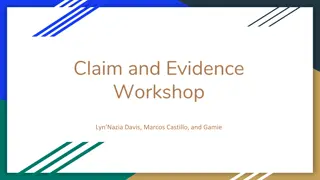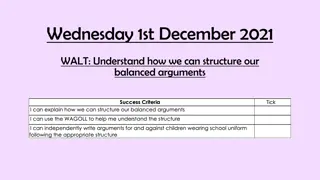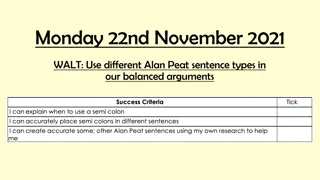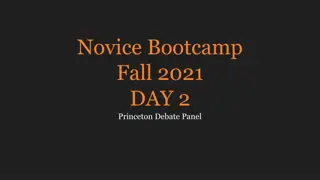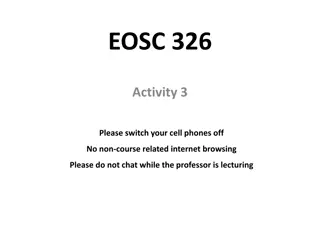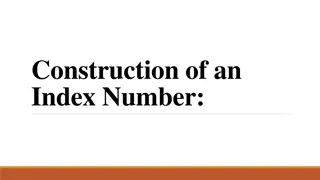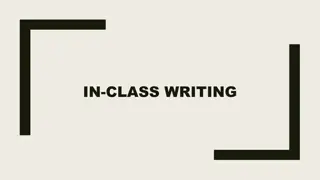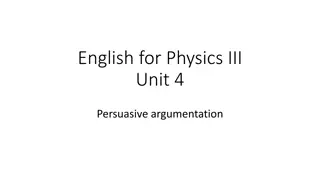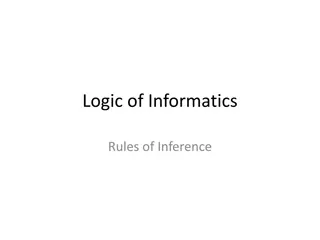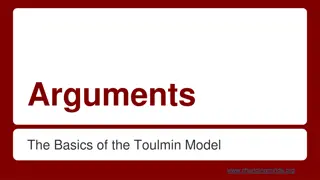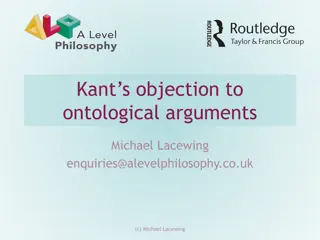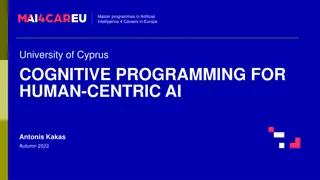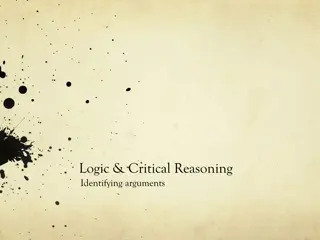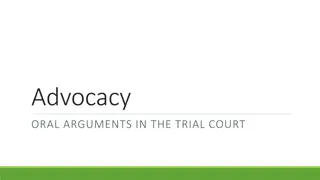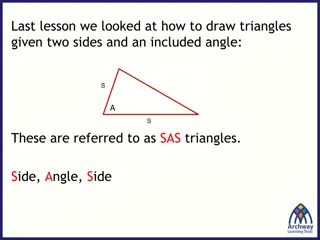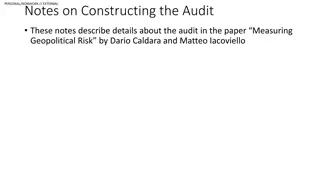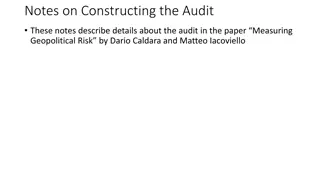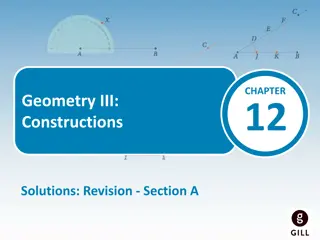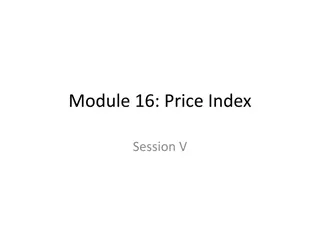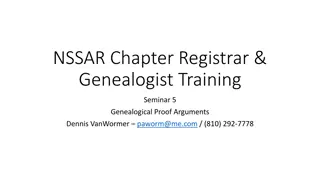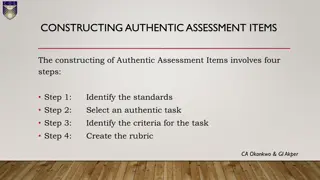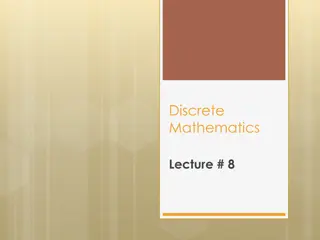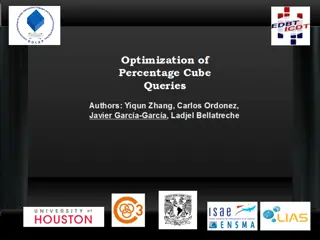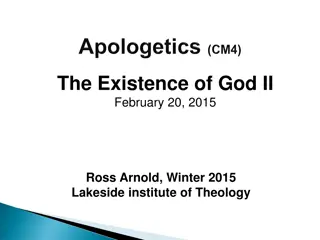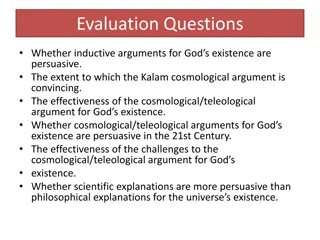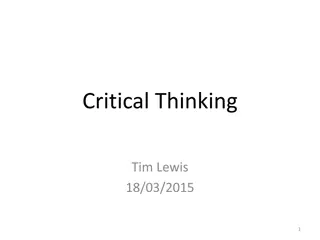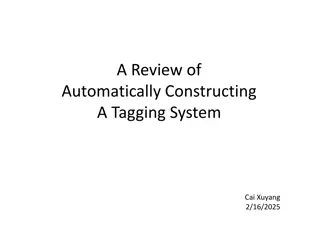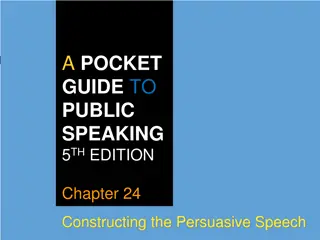Pedagogical Shift in Physical Science: Constructing Knowledge Through Learner-Centered Experiences
There is a significant pedagogical shift in physical science education from viewing science as a fixed body of knowledge to emphasizing the process of constructing knowledge. Learners are now placed at the center stage, engaging in inquiry-based learning, critical thinking, and collaborative interac
3 views • 21 slides
Mastering the Toulmin Method for Constructing Persuasive Arguments
Learn how to effectively structure arguments using the Toulmin Method, which consists of Claim, Data, Warrant, Backing, Counterclaim, and Rebuttal elements. Explore reasoning and logic concepts, differentiate between inductive and deductive reasoning, and understand how to construct valid arguments
0 views • 30 slides
Structure of Balanced Arguments
Explore the concept of using the third person in writing balanced arguments to maintain objectivity and structure. Learn about third person pronouns and the importance of being unbiased in your writing. Understand the significance of structuring your arguments and maintaining a clear order for effec
0 views • 11 slides
Mastering Alan Peat's Balanced Arguments with Different Sentence Types
Explore the use of various Alan Peat sentence types in crafting balanced arguments, focusing on incorporating semi-colons effectively. Engage in interactive activities and practice sessions to enhance your skills in creating compelling arguments. Dive into examples and exercises to refine your under
2 views • 12 slides
Mastering Debate: Essential Strategies and Techniques
Learn key concepts like argument structure, points of clarification, and how to make compelling arguments in a debate setting. Discover the importance of warrants, impacts, and implications in formulating strong arguments. Explore tips on coming up with effective arguments and understanding differen
0 views • 47 slides
Mastering Final Focus in Debates
Final Focus, a crucial 2-minute speech at the end of a debate, serves as your last chance to persuade the judge of your victory. It involves comparing key voters and emphasizing the impact of your arguments. Weighing key voters is essential, with a focus on demonstrating why the scale tips in your f
2 views • 4 slides
Your Ultimate Guide to Constructing Windows
Windows are vital in home design, offering natural light, ventilation, and aesthetic appeal. This guide delves into the essential aspects of constructing windows, including types, materials, and design considerations. It highlights the importance of
1 views • 7 slides
Rock Correlation Through Facies and Biostratigraphy
Explore the correlation of rocks using facies and biostratigraphy in Activity 3 of EOSC 326. Learn about constructing biozones, correlating stratigraphic logs, and interpreting paleoenvironments. Discover the significance of fossils B and F in correlation and apply techniques like seriation in const
6 views • 19 slides
Constructing Perpendiculars: Shortest Distance to a Point
Learn how to find the shortest distance from a point to a line, ensuring the path taken is efficient and direct. By constructing a perpendicular from the point to the line, you guarantee the shortest possible route, creating a right angle with the line. Explore the process of constructing perpendicu
3 views • 17 slides
Methods of Constructing Index Numbers
Various methods of constructing index numbers, such as un-weighted index, simple aggregate method, and simple average of price relatives method, are explained in detail. These methods play a crucial role in analyzing price changes over time and comparing different economic indicators. Each method of
0 views • 6 slides
Reasonable Arguments vs. Pseudo-Arguments
The provided content focuses on distinguishing between reasonable arguments and pseudo-arguments through thought-provoking questions such as the ethical treatment of animals, city subsidies for sports venues, and subjective opinions on aesthetics. It also explains the structure of an argument, highl
0 views • 18 slides
Energy Sources and Arguments in Physics III Unit 4
Delve into persuasive argumentation techniques with connectors like "despite," "although," and "even though" in English for Physics III. Practice constructing strong arguments and evaluating different perspectives on energy sources through discussions and listening exercises. Explore the effectivene
1 views • 32 slides
Valid and Invalid Arguments in Logic
In logic, arguments consist of premises supporting a conclusion, with deductive arguments claiming logical necessity. Valid arguments have premises implying the conclusion, making them deductively valid. For example, if all actors are robots and Tom Cruise is an actor, then logically Tom Cruise must
0 views • 25 slides
Rules of Inference in Logic
Dive into the world of logic with this detailed exploration of rules of inference. Learn about different types of arguments, such as Modus Ponens and Modus Tollens, and understand how to determine the validity of an argument. Discover the purpose of rules of inference and unravel the logic behind co
0 views • 17 slides
An Examination of Ontological Arguments for God's Necessary Existence
Various ontological arguments, such as Malcolm's and Anselm's, propose that the existence of God is logically necessary, grounded in the concept of God as the greatest possible being. These arguments challenge the coherence of the concept of God and counter objections, like Kant's claim that existen
2 views • 10 slides
Toulmin Model for Effective Argumentation
The Toulmin Model provides a structured approach to crafting and evaluating arguments, consisting of key components like claims, grounds/data, and warrants. It emphasizes the importance of using evidence and reasoning to support claims effectively. By understanding this model, one can enhance the pe
0 views • 13 slides
Kant's Critique of Ontological Arguments
An exploration of Kant's objection to ontological arguments, examining the flaws in the reasoning of Anselm and Descartes. Kant argues that existence is not a predicate and does not enhance the concept of a being. Therefore, ontological arguments cannot prove the existence of God solely through conc
0 views • 7 slides
Argumentation and Realization in AI Master Programmes
Exploring the concept of argumentation and its realization in artificial intelligence master programmes, focusing on the construction, evaluation, and implementation of arguments through cognitive programming. The framework involves structured argumentation, conflict relations, and strength/preferen
1 views • 31 slides
Logic and Critical Reasoning: Identifying Arguments
In the study of logic and critical reasoning, identifying arguments is a fundamental task. Arguments consist of premises supporting a conclusion, and they can be identified by specific indicators and techniques. Understanding argument structure and types of support, such as deductive and inductive,
2 views • 15 slides
Guide to Oral Arguments in Trial Court
Learn how to conduct oral arguments in a trial court, including the steps for both the movant and respondent, strategies for making strong arguments, and tips for responding effectively. This comprehensive guide covers the dos and don'ts of oral arguments, emphasizing the importance of preparation,
0 views • 9 slides
Supporters of Slavery in the 19th Century: Legal, Religious, and Economic Arguments
In the 19th century, defenders of slavery utilized legal arguments by denying citizenship rights to blacks, religious arguments by justifying ownership and guidance through biblical references, and economic arguments by comparing treatment of slaves in the South to conditions of workers in the North
0 views • 4 slides
Command-line Arguments and Errors
Learn how to utilize command-line arguments in Python scripts to enhance flexibility and parametrize functions for various inputs. Explore ways to access and utilize command-line arguments effectively, while handling errors gracefully.
0 views • 30 slides
Constructing SSS Triangles: A Geometric Exercise
Explore the construction of Side-Side-Side (SSS) triangles step-by-step, using compass and straightedge techniques to draw triangles given specific side lengths. Understand the process of constructing triangles without angle information and enhance your geometric skills with practical examples.
0 views • 13 slides
Insights on Constructing Geopolitical Risk Audit
Details on constructing the audit for the paper "Measuring Geopolitical Risk" by Dario Caldara and Matteo Iacoviello are outlined. It covers the process of building the GPR index, designing the audit sample, and coding articles to identify geopolitical risks discussed in newspapers. The methodology
0 views • 17 slides
Detailed Notes on Constructing the Audit for Measuring Geopolitical Risk
The notes provide insights into constructing the audit for measuring geopolitical risk as outlined in the paper by Dario Caldara and Matteo Iacoviello. It covers the construction of the index, design of the audit sample, reading articles, and coding them based on geopolitical risk references. The pr
0 views • 20 slides
Analyzing Arguments in English Debates: A Critical Approach
Explore and critique various arguments presented in English debates, including topics like dietary recommendations, digestion issues with Japanese rice, and driving skills in different weather conditions. Learn how to evaluate evidence, causality, and persuasiveness in arguments to develop critical
0 views • 19 slides
Geometry Constructions Revision Solutions Section A
This chapter provides step-by-step instructions and solutions for constructing different geometric shapes like triangles and rectangles. Detailed guidelines are given to construct triangles with specific side lengths and angle measurements, as well as an equilateral triangle. The content also covers
0 views • 19 slides
Mastering Academic Writing Moves: The Art of Summarizing
In academic writing, mastering the art of summarizing is crucial for persuasive arguments. By engaging in dialogue with others and summarizing their arguments, writers can strengthen their position. It is important to strike a balance between the original author's ideas and your own, emphasizing asp
0 views • 15 slides
An Overview of Debate: Propositions, Teams, and Formats
Debate is a regulated discussion between two matched sides discussing a proposition, with the affirmative arguing for change and the negative defending the status quo. The standard debate format involves constructive arguments followed by rebuttals from both sides. The roles in a debate include the
0 views • 47 slides
Constructing Price Index: General Procedure and Aggregation
The process of constructing a price index involves various steps such as computation of price relatives, aggregation at different levels, selection of base period, and designing data collection methods. Weighted arithmetic mean and simple ratio calculations are used in aggregating price indices. A t
1 views • 31 slides
Genealogical Proof Arguments and SAR Standard of Proof
This detailed content covers the definitions and components of genealogical proof arguments, proof summaries, and the SAR standard of proof. It explains the importance of evidence quality, source citations, and analysis in establishing acceptable genealogical conclusions for SAR membership applicati
0 views • 22 slides
Constructing Authentic Assessment Items: A Guide in 4 Steps
Constructing authentic assessment items involves four steps: identifying standards, selecting an authentic task, defining criteria, and creating a rubric. Standards are specific skills and knowledge students should gain. Tasks should reflect these standards. Criteria measure student mastery. Rubrics
0 views • 25 slides
Valid and Invalid Arguments in Discrete Mathematics
Concepts of valid and invalid arguments in discrete mathematics are explored through examples. Learn how to determine the validity of arguments based on premises and conclusions. Practice using truth tables to evaluate argument forms. Enhance your logical reasoning skills in Discrete Mathematics.
0 views • 22 slides
Optimizing Queries and Constructing Percentage Cube in Business Intelligence
Presented at ENSMA, this paper introduces optimized strategies for constructing a percentage cube to enhance processing of complex queries in modern business intelligence. It discusses challenges, comparison between percentage queries and percentage cube, and showcases a data cube analysis of car sa
0 views • 21 slides
Philosophical Apologetics: Arguments for the Existence of God
Philosophical apologetics presents various arguments for the existence of God, including the ontological, cosmological, teleological, moral, transcendental, and presuppositional arguments. These arguments cover diverse aspects such as change, causality, design, contingency, miracles, consciousness,
0 views • 10 slides
Evaluating Arguments for God's Existence in the 21st Century
Exploring the persuasiveness of inductive arguments for God's existence, assessing the Kalam cosmological argument, and evaluating the effectiveness of cosmological/teleological arguments. Delving into whether scientific explanations surpass philosophical ones, the strengths and weaknesses of these
0 views • 16 slides
Critical Thinking, Hypotheses, and Arguments
Explore the concepts of critical thinking, hypotheses, and arguments in this informative content. Learn about the definition of hypotheses, the nature of arguments, and syllogisms. Delve into the world of logical reasoning and the foundations of thought processes.
0 views • 32 slides
Constructing a Distance Sensitivity Oracle with Subcubic Preprocessing Time
This research focuses on constructing a Distance Sensitivity Oracle (DSO) in subcubic preprocessing time, breaking previous barriers, and achieving constant query time. Various algorithms, techniques, and results in the realm of graph algorithms and All-Pairs Shortest Paths are discussed and compare
0 views • 16 slides
Automatically Constructing a Tagging System Overview" (Character count: 47)
This review delves into the process of automatically constructing a tagging system by examining tag extraction, assignment, and recommendation in software engineering. It discusses the advantages of tagging, current website tagging scenarios, and the techniques used for tag extraction, with a focus
0 views • 24 slides
Constructing the Persuasive Speech: Methods of Persuasion and Credibility
Building credibility and utilizing methods of persuasion are essential in constructing a persuasive speech. Explore ethos, types of credibility, pathos, and logos along with tips on enhancing credibility and generating emotional appeals. Learn about the four types of reasoning and guidelines for eff
0 views • 27 slides

